|
|
|
Sort Order |
|
|
|
Items / Page
|
|
|
|
|
|
|
| Srl | Item |
| 1 |
ID:
104554
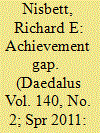

|
|
|
| 2 |
ID:
187071


|
|
|
|
|
| Summary/Abstract |
It is widely accepted that race is socially constructed. Despite this, deference to race witnesses scholarship and activism becoming complicit in the reification of race and the reproduction of its effects. Gilroy describes ‘‘the pious ritual in which we always agree that ‘‘race’’’ is invented but then are required to defer to its embeddedness in the world and to accept that the demand for justice requires us nevertheless innocently to enter the political arenas it helps to mark out’. This article engages this contention through reflection on the political deployment of race in Southhall Black Sisters. Empirical data and postracial theory extend the analysis to examine an applied postracialism and to consider whether we have arrived at a new antiracist conjuncture. Ultimately, this theoretically informed and empirically engaged article examines the role of race in antiracist politics and reflects on its future as a tool for performing such principled labor.
|
|
|
|
|
|
|
|
|
|
|
|
|
|
|
|
| 3 |
ID:
148242
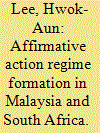

|
|
|
|
|
| Summary/Abstract |
This paper examines the formation of majority-favouring affirmative action (AA) regimes in Malaysia and South Africa. Malaysia’s Constitution premises AA on a group’s special position; South Africa’s refers to unfair discrimination. Malaysia established AA amid continuation of a political order and consolidation of executive power, while South Africa democratized and transitioned from minority to majority rule. Minority groups held less economic power in Malaysia than in South Africa. Consequently, AA in Malaysia is characterized by discretionary decision-making, and quota-based, centralized programmes, whereas South Africa has followed a legislative route involving negotiation and enforcement of target-based, statutory requirements, under less centralized oversight.
|
|
|
|
|
|
|
|
|
|
|
|
|
|
|
|
| 4 |
ID:
138761
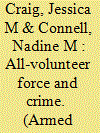

|
|
|
|
|
| Summary/Abstract |
Sampson and Laub’s age-graded theory of informal social control posits that social bonds created through marriage, military, and employment lead to a decrease of criminal behavior or desistance. Most research has focused primarily on the roles of marriage and employment in this process, ignoring the impact of military service on future offending behavior. However, recent US military involvement in the Middle East suggests that the effects of military experience on individuals should be reevaluated. Using data collected from a more recent sample of military-involved individuals, all of whom served in the All-volunteer Force, this study examines how participation in the military impacts offending and potential desistance. The results
demonstrate that, overall, modern-day military involvement does not have the same protective effect on future offending as observed in World War II samples. Racial subgroup analyses, however, suggest that military involvement leads to a greater likelihood of desistance for minority service members.
|
|
|
|
|
|
|
|
|
|
|
|
|
|
|
|
| 5 |
ID:
077215
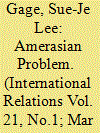

|
|
|
|
|
| Publication |
2007.
|
| Summary/Abstract |
The concept of 'mixed blood' is not a new one; however, it was not until 1982 that an unprecedented policy entitled 'The Amerasian Act' was created by the US government. Focusing on the author's ethnographic fieldwork in South Korea and the US, this article will unpack the assumptions underlying the seemingly religious statement 'the American thing to do' in terms of US policy, where ostensibly scientific notions of 'race', blood and identity are employed
|
|
|
|
|
|
|
|
|
|
|
|
|
|
|
|
| 6 |
ID:
104552
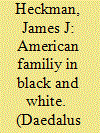

|
|
|
| 7 |
ID:
105362
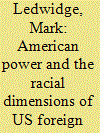

|
|
|
|
|
| Publication |
2011.
|
| Summary/Abstract |
This article consists of a critical discourse that examines the meteoric rise of Barack Obama within the context of international and domestic race relations. The article explores the impact of American racism on domestic and foreign affairs, in addition to providing contrasting viewpoints on the significance of Obama's election to the presidency. The article utilises the Obama phenomenon to assess US perceptions of the North-South divide, race, ethnicity, religion and anti-Americanism, in addition to unpacking the controversy surrounding Rev. Jeremiah Wright's characterisations of American power. The Obama campaign's post-9/11 context will be used to ascertain whether conservative efforts to associate Obama with Islam represent a conservative backlash that represents an ethnocentric re-articulation related to race, religion and the War on Terror, followed by an assessment of whether the Obama phenomenon is indicative of the perfectibility of US democracy, which would justify the exportation of American values. The article will engage in an interdisciplinary discourse grounded in political science, history and IR to provide the depth of knowledge and theoretical competency to frame the discussion in a historical and contemporary context that acknowledges Obama's relevance to domestic and international politics.
|
|
|
|
|
|
|
|
|
|
|
|
|
|
|
|
| 8 |
ID:
101283
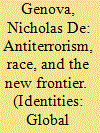

|
|
|
|
|
| Publication |
2010.
|
| Summary/Abstract |
Following Barack Obama's election as United States president, the illusion that the worst excesses of the Bush administration are now simply finished must be tempered by a sober assessment of the deeply consequential institutionalization of antiterrorism as the intransigent idiom of a new species of security state formation. Obama's assumption of responsibility for the conduct of the so-called War on Terror has committed him to the dominant ethos of antiterrorism and a multifaceted program of securitization, "domestically" and internationally. Furthermore, the task of reinvigorating United States nationalism by exalting American exceptionalism is one that deeply conjoins Obama with his predecessor. This is, perhaps, nowhere so evident as in Obama's dissimulations of the racial singularity and salience of his accession to the presidency. Indeed, he compulsively deracialized his election in favor of an American exceptionalist gesture of patriotic postracialism. This essay interrogates the relation between this "postracial" Americanism and a distinctly imperial multiculturalism. Through this "postracial" and assimilationist vision of empire, and by means of the crucial (racially ambiguous) figure of the Muslim, the United States has fashioned itself as the decisive police power of an incipient Global Security State, charged with putting in order the wild new frontiers of an unruly planet.
|
|
|
|
|
|
|
|
|
|
|
|
|
|
|
|
| 9 |
ID:
086660
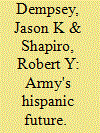

|
|
|
|
|
| Publication |
2009.
|
| Summary/Abstract |
Using data from the Citizenship & Service: 2004 Survey of Army Personnel, a probability sample of active duty soldiers and officers, this study examines key questions concerning success in the military for racial and ethnic minorities. It focuses on the degree to which Hispanics are integrated into the Army and compares the experiences of Hispanics to the experiences of whites and blacks. After assessing why Hispanics join the Army and choose their occupational specialties, the study looks at how Hispanics perceive Army life, their personal experiences with discrimination, and the progress of the Army in the area of racial and ethnic integration. By comparing the attitudes of Hispanics to those of whites and blacks, it explores the degree to which race and ethnicity influence life in the Army and the implication of this for the military's future.
|
|
|
|
|
|
|
|
|
|
|
|
|
|
|
|
| 10 |
ID:
190118
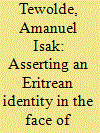

|
|
|
|
|
| Summary/Abstract |
Current literature on Eritrean national identity has been dominated by debates on its function as a unifying and homogenising civic identity in a context of a multi-ethnic, multi-religious and multi-clan national context. Little is known, however, about how an Eritrean national identity is mobilised among Eritreans living in racially organised host societies. This paper addresses this lacuna by examining how Eritrean refugees living in a racially classified South African host society self-identified. The focus of analysis for this paper was how an Eritrean national identity was mobilised by some participants in the face of experiencing racial classification. Some individuals defined themselves as ‘Eritrean’ to resist their classification as ‘Black’ in everyday life. I argue that beyond functioning as a homogenising and unifying civic identity, an Eritrean national identity functioned as a bulwark against ascribed racial classification in a race-conscious South African host society,
|
|
|
|
|
|
|
|
|
|
|
|
|
|
|
|
| 11 |
ID:
159383
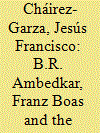

|
|
|
|
|
| Summary/Abstract |
This paper analyses Ambedkar's challenge to racial theories of untouchability. It examines how Franz Boas’ ideas about race, via Alexander Goldenweiser, influenced Ambedkar's political thought. Ambedkar is situated as a thinker aware of larger changes taking place in Western academia in the early twentieth century. During his time at Columbia University, Ambedkar familiarised himself with ideas that rejected the fixity of identities and racial hierarchies; following Boas, he rejected the idea that the untouchables’ place in society was determined by their supposed racial inferiority. Instead, he argued that untouchability was a cultural problem that could be stamped out.
|
|
|
|
|
|
|
|
|
|
|
|
|
|
|
|
| 12 |
ID:
143677
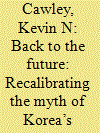

|
|
|
|
|
| Summary/Abstract |
This article reviews Korea’s multicultural past, while also tracing the evolution of the myth of ethnic Korean homogeneity via the Tan’gun myth, whose earliest extant record dates from the thirteenth century. It highlights how the myth was recalibrated in the twentieth century in the face of Japanese cultural imperialism, and used to promote a nationalist, homogenous Korean identity. By exploring past intercultural exchanges and developments, this article also illustrates how this modern ‘homogenous’ identity has been misconstructed by both North and South Korea. This is now especially anachronistic for contemporary South Korea, which is fast becoming multiracial and multicultural, but where biracial people are often discriminated against. Finally, I argue that by deconstructing the Tan’gun myth, one discovers that it already inherently possesses the potential to resolve the problematic nationalistic myth of ethnic homogeneity in a growing multiracial society, which still, in the twenty-first century, emphasises racial ‘purity’.
|
|
|
|
|
|
|
|
|
|
|
|
|
|
|
|
| 13 |
ID:
181090
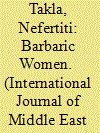

|
|
|
|
|
| Summary/Abstract |
This article analyzes the sensationalized media coverage of a serial murder case during the Egyptian revolution of the early interwar era. Despite conflicting evidence, the media blamed the murders on two sisters from southern Egypt named Raya and Sakina. Through a close reading of Egyptian editorials and news reports, I argue that middle-class nationalists constructed Raya and Sakina as barbaric women who threatened to pull the nation back in time in order to legitimize their claim to power. Borrowing from Ann Stoler's analysis of the relationship between race and sexuality and Maria Lugones's concept of the modern/colonial gender system, this article maintains that race was as central to nationalist conceptions of female barbarism as gender, sexuality, and class. The enduring depiction of Raya and Sakina as the quintessential barbaric Egyptian women symbolizes the way in which the modern woman was constructed at the intersection of race and sexuality.
|
|
|
|
|
|
|
|
|
|
|
|
|
|
|
|
| 14 |
ID:
093965
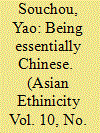

|
|
|
|
|
| Publication |
2009.
|
| Summary/Abstract |
The Postmodern view of Chinese identity, with its emphasis on self-invention and culture performance, does not gel with the real difficulties of identity formation in the real social, political world. While the approach exposes the fetishism of race, it replaces race with culture still seen in totalizing, essentialzing terms.
|
|
|
|
|
|
|
|
|
|
|
|
|
|
|
|
| 15 |
ID:
092544
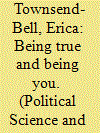

|
|
|
|
|
| Publication |
2009.
|
| Summary/Abstract |
Fieldwork advice has increased and improved over the years. Yet, the bulk of political science fieldwork advice is general; it assumes that the subject to whom advice is given is simply a political scientist-in training, perhaps-with no other salient identities that might intercede (but see Mazzei and O'Brien 2005 and the PS 2006 fieldwork symposium, The Methodologies of Field Research in the Middle East, for recent exceptions). Of course in reality it is not just the fieldwork setting that varies; the relationship of the researcher to the field matters a great deal-and that may be much more dependent on our specific identities than we have previously credited. It is not simply the subjects that we study, but us as well who have to negotiate sometimes sticky issues of race, class, gender, nationality, and so forth.
|
|
|
|
|
|
|
|
|
|
|
|
|
|
|
|
| 16 |
ID:
183870
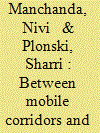

|
|
|
|
|
| Summary/Abstract |
This article wrestles with the question of ‘national’ borders in racial capitalism. We do so through an examination of border and capitalist corridors. We focus particularly on the Israeli border, branded and then sold to the rest of the world by the epistemic community of border-makers and interlocutors. In tracking the Israeli border and showing the implication of the experts and their markets, we ask how the border reflects and is refracted through a global order organized by the twin dictates of racism and capitalism. We are especially interested in how racialized processes of bordering, ostensibly governed by national exigencies, are transplanted on to other contexts. Two points emerge from this: in the first instance, we ask who and what enables this movement of the border. And in the second, we interrogate which logics and practices are transplanted with the border, as it is reproduced and seemingly fixed in a new place. We examine the violent ontologies that give shape and reputation to Israel's high-tech border industry, which has become a model for the ever-growing global homeland security industry. We ask: has Israel's border become an exportable commodity and who are the actors who have enabled this ‘achievement’? Related to this, what sort of occlusions and structural violence does the fetishization of the Israeli border rely on?
|
|
|
|
|
|
|
|
|
|
|
|
|
|
|
|
| 17 |
ID:
127803
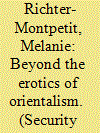

|
|
|
|
|
| Publication |
2014.
|
| Summary/Abstract |
Contrary to commonsense understandings of torture as a form of information-gathering, confessions elicited through the use of torture produce notoriously unreliable data, and most interrogation experts oppose it as a result. With a focus on the US carceral regime in the War on Terror, this article explores the social relations and structures of feelings that make torture and other seemingly ineffective and absurd carceral practices possible and desirable as technologies of security. While much of international relations scholarship has focused on the ways in which affective and material economies of Orientalism are central to representations of the 'terrorist' threat, this article connects the carceral violences in the racialized lawfare against Muslimified people and spaces to the capture and enslavement of Africans and the concomitant production of the figure of the Black body as the site of enslaveability and openness to gratuitous violence. The article further explores how these carceral security practices are not simply rooted in racial-sexual logics of Blackness, but themselves constitute key sites and technologies of gendered and sexualized race-making in this era of 'post-racial triumph' (HoSang and LaBennett, 2012: 5).
|
|
|
|
|
|
|
|
|
|
|
|
|
|
|
|
| 18 |
ID:
174597
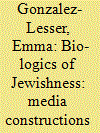

|
|
|
|
|
| Summary/Abstract |
The specific ethno-racial position of Jewishness offers an ideal case study for contemporary U.S. racialisation processes. Despite a proclaimed end to biologisation in a supposed ‘post-racial’ era, essentialist reasoning remains central to U.S. race-making. Employing a content analysis of the New York Times and the Los Angeles Times (2000–2010), I find that biologically rooted constructions of Jewishness occur through appeals to (1) physical definitions based on DNA or phenotype, and (2) subtle biologisation vis-à-vis ancestral claims. Demonstrating both explicit and subtle biologisation expands social scientists’ understanding of race, ethnicity, and Jewish identities.
|
|
|
|
|
|
|
|
|
|
|
|
|
|
|
|
| 19 |
ID:
084483
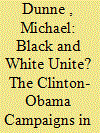

|
|
|
|
|
| Publication |
2008.
|
| Summary/Abstract |
Senators Hillary Clinton and Barack Obama are battling to win the Democratic party's nomination as presidential candidate in 2008. Never has a white woman or a black man been so close to entering the White House. Standing in their way is Republican Senator John McCain, who would be the oldest white male ever to become US president. A possible spoiler for any of the three is the perennial campaigner, Ralph Nader. The political, social and economic histories of women and African Americans have been entwined, often to the cost of the other, since before the American Civil War. Before World War I the issue was the suffrage; then came the struggles for (women's) equal rights and (African American) civil rights, particularly after World War II. These narratives, with the related cross-currents of class and ethnicity, are explored in relation to contemporary history and politics, especially the continuing gender and racial 'gaps' in US society.
|
|
|
|
|
|
|
|
|
|
|
|
|
|
|
|
| 20 |
ID:
155525
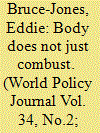

|
|
|
|
|
| Summary/Abstract |
Oury Jalloh, an asylum-seeker from Sierra Leone, burned to death chained to a mattress in a German holding cell. Eddie Bruce-Jones, a senior legal lecturer at University of London’s Birkbeck College School of Law, writes that the myriad mistakes in the investigation and prosecution of Jalloh’s case reveal patterns institutional racism that many Germans are unwilling to confront.
|
|
|
|
|
|
|
|
|
|
|
|
|
|
|
|
|
|
|
|
|